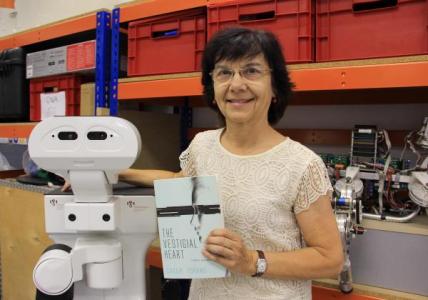Carme Torras
Spanish Scientific Research Council (CSIC), Spain
United States
Research Areas
AI-Based Methods, Cognitive Human-Robot Interaction, Collision Avoidance, Computational Geometry, Dual Arm Manipulation, Ethics and Philosophy, Formal Methods in Robotics and Automation, Grasping, Human Factors and Human-in-the-Loop, Human-Centered Robotics, Kinematics, Learning and Adaptive Systems, Learning from Demonstration, Manipulation Planning, Motion and Path Planning, Parallel Robots, Parallel Robots, Perception for Grasping and Manipulation, Physical Human-Robot Interaction, Physically Assistive Devices, RGB-D Perception, Robot Companions, Task Planning
Interview Synopsis
In this interview, Torras discusses how she became interested in robotics, her evolution in research interests, her hopes in bringing the robots and humans closer together, and culture of the robotics world in Spain. She also gives advice to prospective students who are interested in robotics and talks about the issue of diversity in the engineering field.




Carme Torras (www.iri.upc.edu/people/torras) is Research Professor at the Robotics Institute (CSIC-UPC) in Barcelona, where she leads a research group on assistive and collaborative robotics. She received M.Sc. degrees in Mathematics and Computer Science from the University of Barcelona and the University of Massachusetts, respectively, and a Ph.D. degree in Computer Science from the Technical University of Catalonia (UPC). She has led sixteen European projects, the latest being her ERC Advanced Grant project CLOTHILDE – Cloth manipulation learning from demonstrations. Prof. Torras is IEEE and EurAI Fellow, member of Academia Europaea and the Royal Academy of Sciences and Arts of Barcelona. She has served as Senior Editor of the IEEE Transactions on Robotics, Associate Vice-President for Publications of the IEEE Robotics and Automation Society (RAS), and member of the Administrative Committee of IEEE RAS in the period 2016-2018. Convinced that science fiction can help promote ethics in robotics and new technologies, one of her novels - winner of the Pedrolo and Ictineu awards - has been translated into English with the title The Vestigial Heart (MIT Press, 2018) and published together with online materials to teach a course on “Ethics in Social Robotics and AI”.